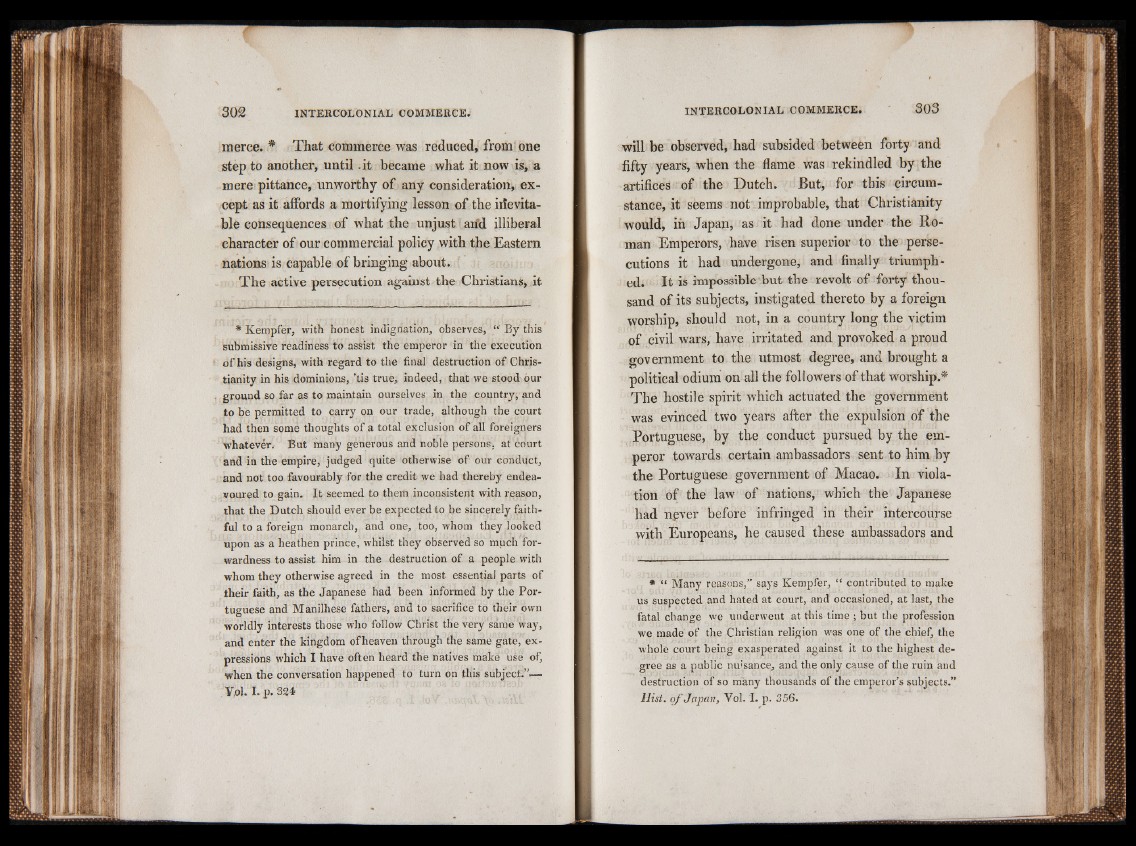
merce. * That commerce was reduced, from one
step to another, until .it became what it now is, a
mere pittance, unworthy of any consideration, except
as it affords a mortifying lesson of the inevitable
consequences of what the unjust arid, illiberal
character of our commercial policy with the Eastern
nations is capable of bringing about.
The active persecution against the Christians, it
* Kempfer, with honest indignation, observes, “ By this
submissive readiness to assist the emperor in the execution
of his designs, with regard to the final destruction of Christianity
in his dominions, ’tis true, indeed, that we stood our
ground so far as to maintain ourselves in the country, and
to be permitted to carry on our trade, although the court
had then some thoughts of a total exclusion of all foreigners
whatever. But many generous and noble persons, at court
and in the empire, judged quite otherwise of our conduct,
and not too favourably for the credit we had thereby endeavoured
to gain. It seemed to them inconsistent with reason,
that the Dutch should ever be expected to be sincerely faithful
to a foreign monarch, and one, too, whom they looked
upon as a heathen prince, whilst they observed so much forwardness
to assist him in the destruction of a people with
whom they otherwise agreed in the most essential parts of
their faith, as the Japanese had been informed by the Portuguese
and Manilhese fathers, and to sacrifice to their own
worldly interests those who follow Christ the very same way,
and enter the kingdom of heaven through the same gate, expressions
which I have often heard the natives make use of,
when the conversation happened to turn on this subject.”—
Vol. I. p. 324
will be observed, had subsided between forty and
fifty years, when the flame was rekindled by the
artifices of the Dutch. But, for this circumstance,
it seems not improbable, that Christianity
would, in Japan, as it had done under the Roman
Emperors, have risen superior to the persecutions
it had undergone, and finally triumphed.
It is impossible but the revolt of forty thousand
of its subjects, instigated thereto by a foreign
worship, should not, in a country long the victim
of civil wars, have irritated and provoked a proud
government to the utmost degree, and brought a
political odium on all the followers of that worship.*
The hostile spirit which actuated the government
was evinced two years after the expulsion of the
Portuguese, by the conduct pursued by the emperor
towards, certain ambassadors sent to him by
the Portuguese government of Macao. In violation
of the law of nations, which the Japanese
had never before infringed in their intercourse
with Europeans, he caused these ambassadors and
* “ Many reasons,” says Kempfer, “ contributed to make
us suspected and hated at court, and occasioned, at last, the
fatal change we underwent at this time ; but the profession
we made of the Christian religion w-as one of the chief, the
whole court being exasperated against it to the highest degree
as a public nuisance, and the only cause of the ruin and
destruction of so many thousands of the emperor’s subjects.”
Hist, o f Japan, Vol. I. p. 356.